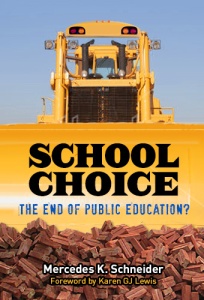The Gimmick Behind a Walton-Featured, 100-Percent-College-Acceptance Charter School
In April 2018, the Walton Family Foundation (WFF) announced that it formed two new nonprofits for the purpose of loaning money to charter schools “to make it easier and more affordable for public charter schools to find, secure and renovate facilities.”

Siblings Robson, Alice, and Jim Walton
One particular point about the above press release caught my attention. But first, a splash of Walton ed reform history:
The Walton effort to advance school choice is nothing new. When it comes to promoting vouchers and charters, Walton money is scattered nationwide. For example, the Arkansas-based, billionaire Walton family pours millions into school choice, including its charter startup grants and even elections in other states, such as the November 2016 Massachusetts charter-expansion ballot initiative and Louisiana’s state board of education elections in 2011 and 2015. Also in 2015, WFF published its five-year plan to establish “choice ecosystems.”
In Arkansas, the Waltons purchased a “department of education reform” at the University of Arkansas (more about that here), which runs the “school choice demonstration project,” which is “devoted to the rigorous and unbiased evaluation of school choice programs and other school improvement efforts across the country.”
There is much more. (For a notable dose of that “much more,” peruse my Walton category of blog postings.)
Now, let us return to that WFF April 2018 press release on two new nonprofits formed to loan money to charter schools for facilities:
What caught my attention was the opening attraction– the featured, stellar, charter school example in the announcement– Freedom Preparatory Academy (FPA) (Memphis, TN):
April 9, 2018 — The Walton Family Foundation today announced the creation of the Charter Impact Fund and Facilities Investment Fund. The two distinct non-profit funds are supported through the foundation’s Building Equity Initiative, an unprecedented effort to make it easier and more affordable for public charter schools to find, secure and renovate facilities. The Charter Impact Fund and Facilities Investment Fund will provide quicker access to long- and short-term financing, respectively.
“Big challenges require bold solutions,” said Alice Walton, Walton Family Foundation Board Member. “This effort will allow resources that were spent on facilities to be directed back into the classrooms, back to the teachers and back to where it should be—with the students.”
Freedom Preparatory Academy Charter Schools—whose entire inaugural graduating class of 2017 was accepted to four-year colleges and universities, in a neighborhood where only 10 percent of residents earn college degrees—are growing to meet the need for quality education options for children in their Memphis, Tennessee community. When Freedom Prep was ready to open its second elementary school, the only option was to start in a temporary facility, even though it meant moving a year later. “Charter schools deserve equal and more seamless access to facilities resources so that we can meet the need in our neighborhoods,” says Charlise Clark Gwin, Chief Financial and Operations Officer, Freedom Prep.
FPA of Memphis, Tennessee, had “its entire inaugural graduating class of 2017 accepted into four-year colleges and universities.”
In fact, FPA’s class of 2018 also yielded a 100-percent college acceptance to four-year universities.
Remarkable, right? And, according to the WFF press release, a success story worthy of “more seamless access to facilities and resources.”
But here’s the catch:
FPA will always have a 100-percent, four-year-college acceptance rate for its graduating classes because it’s written into the student handbook.
There’s the gimmick, folks.
When I research a charter school advertising a 100-percent college acceptance for its graduates, the first document I seek is that charter school’s student handbook.
Even though FPA’s link to its student handbooks includes a sidebar reference to the 2018-19 school year, the only high school student handbook is from 2014-15.
And on page 18, one reads the following as part of FPA’s graduation requirements:
Graduation Requirement #5: Accepting College/University Offer
Freedom Prep requires students to have been admitted to and accepted their offer to attend a four-year college or university by the end of their senior year.
That’s right: Since FPA is not a traditional public school, it has the ability to deny graduation to any student who 1) chooses not to apply to a four-year college; 2) applies and is not admitted, or 3) applies, is admitted, and chooses not to accept the offer.
FPA appears more concerned about its PR than it does about supporting students in less sensational postsecondary plans.
Those students who fail to meet the FPA demand to four-year college admission and acceptance can just go elsewhere. Transfer to another school– a school that admits students at any time of the year and does not force students into a mold that produces sensational, misleading headlines of college acceptance perfection.
A school that the Waltons think less of.
A traditional public school.

____________________________________________________________________________________
Interested in scheduling Mercedes Schneider for a speaking engagement? Click here.
.
Want to read about the history of charter schools and vouchers?
School Choice: The End of Public Education?
Schneider is a southern Louisiana native, career teacher, trained researcher, and author of two other books: A Chronicle of Echoes: Who’s Who In the Implosion of American Public Education and Common Core Dilemma: Who Owns Our Schools?. You should buy these books. They’re great. No, really.
Don’t care to buy from Amazon? Purchase my books from Powell’s City of Books instead.


Wait…what? Huh? You’re kidding me. Amazing how there’s no judge with enough courage anywhere to shut this whole FUGAZY down.
The “cherry picking” of these charter schools also drives the acceptance numbers for the public schools down, and leaves the public schools to have to serve the students who cannot obtain admission to these ‘elitist’ schools. Having a class where all students are going to a four year college has it challenges, but those are subject matter challenges rather than the need to correct multiple years of deficiencies in knowledge (not to mention behavior issues).
the now-called-an-educational-expert politician famous in our district for arguing that teachers HAVE to evaluated by test scores is also known for saying something along the lines of: If you want to have everyone graduate, you have to be willing to push out up to 40%
I live in Northwest Arkansas, home of the Waltons (and Walmart HQ.) I’ve been using the Freedom of Information Act to learn about Arkansas’ top-rated high school — another Walton-funded charter school. It’s astounding what they get away with. https://medium.com/@erlyon/haashall-schoppmeyer-27steps-dc57bff05a80